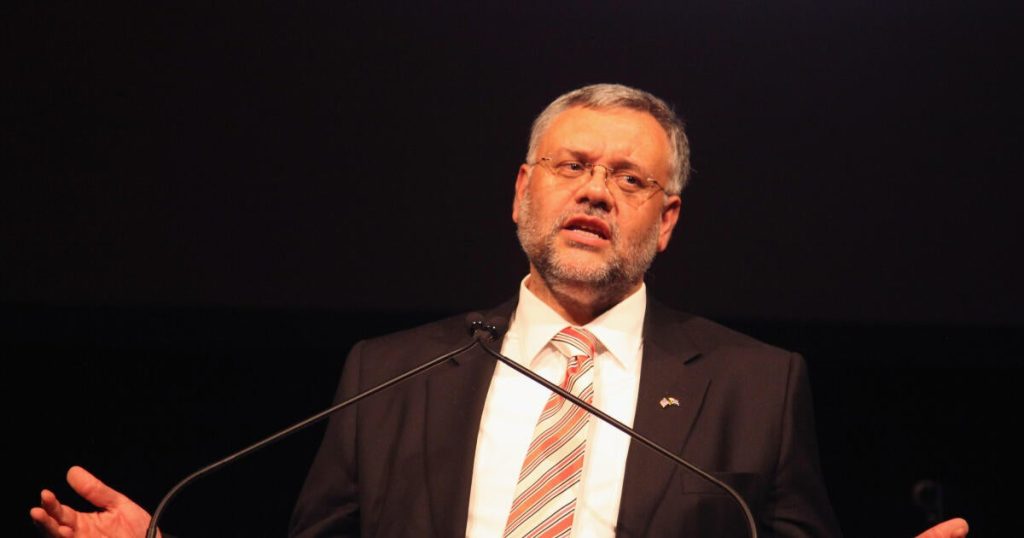In a significant diplomatic upheaval, the U.S. State Department has expelled South Africa’s Ambassador Ebrahim Rasool, citing his controversial remarks about President Donald Trump and his policies. Secretary of State Marco Rubio condemned Rasool in a social media statement, labeling him as a divisive figure, which has prompted swift criticism from South African officials. This incident highlights the escalating tensions between the U.S. and South Africa as both nations grapple with complex diplomatic relationships.
| Article Subheadings |
|---|
| 1) Overview of the Expulsion |
| 2) Reactions from South African Officials |
| 3) Controversy Surrounding Rasool’s Appointment |
| 4) Economic Implications of the Diplomatic Fallout |
| 5) Path Forward for South Africa and the U.S. |
Overview of the Expulsion
On March 17, the U.S. Department of State officially declared Ebrahim Rasool as persona non grata, giving him 72 hours to leave the country. This dramatic action came in response to Rasool’s outspoken criticism of President Trump, specifically during a webinar where he described the president’s policies regarding race and diversity as a “white supremacist response.” The State Department emphasized that Rasool’s claims did not align with diplomatic conduct or the values shared between the nations. Secretary Marco Rubio issued a statement on social media condemning Rasool as a “race-baiting politician who hates America,” reflecting the severity of diplomatic relations between the two countries under Trump’s administration.
Reactions from South African Officials
The expulsion has drawn strong reactions from various South African government officials, with President Cyril Ramaphosa stating that improving ties with the U.S. is critical. He referred to the U.S. as South Africa’s second-largest trading partner, following China. Ramaphosa expressed awareness of the dissatisfaction from the U.S. regarding Rasool’s statements, indicating the need for better diplomatic channels. He confirmed he expects Rasool to return to South Africa and provide a comprehensive report about the developments in Washington. South Africa’s Foreign Minister echoed similar sentiments, describing the expulsion as “unprecedented and regrettable.” They articulated the importance of behind-the-scenes discussions to address mutual concerns, asserting that engaging in public disputes only exacerbates tensions.
Controversy Surrounding Rasool’s Appointment
Rasool’s appointment as Ambassador to the U.S. was met with contention prior to his arrival in Washington, showcasing deep divisions within South Africa’s ruling African National Congress (ANC) party and its coalition government. The decision faced opposition from various political factions within the Government of National Unity (GNU), underscoring the complexities of political alliances in South Africa’s evolving political landscape. Professor Wiliam Gumede from Witwatersrand University noted that Rasool’s pro-Iran and pro-Hamas sentiments have made his role particularly divisive. These views have drawn scrutiny, especially considering South Africa’s diplomatic trajectory and relations with Western nations.
Economic Implications of the Diplomatic Fallout
The deterioration in relations between the U.S. and South Africa raises significant economic concerns. Analysts suggest that continued tensions could result in targeted economic sanctions from the United States, with potential repercussions including the loss of hundreds of thousands of jobs in South Africa. The impact of economic sanctions would not only affect direct employment but could also lead to widespread job insecurity through indirect channels. The critical nature of U.S. foreign aid and investment in South Africa’s economy is underscored by the fears expressed by experts regarding the possible sanctions. As South Africa grapples with an already challenging economic landscape, the need for stabilizing diplomatic relations becomes increasingly urgent.
Path Forward for South Africa and the U.S.
In light of the current diplomatic embers, experts recommend proactive measures to mend U.S.-South African relations. Professor Gumede posits that President Ramaphosa should publicly condemn Rasool’s comments as unacceptable while emphasizing the importance of U.S. relations. Such a diplomatic strategy could help align South Africa’s priorities with those of the U.S., fostering a collaborative environment. Engagement with Trump’s inner circle may also prove essential; building a coalition from non-ANC partners could lead to strategic dialogues aimed at addressing the discord. Recognizing the integral nature of robust U.S.-South African relations is crucial for both parties, as ongoing cooperation is vital for regional stability and development.
| No. | Key Points |
|---|---|
| 1 | The U.S. expelled South Africa’s Ambassador Ebrahim Rasool following controversial remarks about President Trump. |
| 2 | Secretary Marco Rubio publicly condemned Rasool’s statements as detrimental to U.S. relations. |
| 3 | South African officials, including President Ramaphosa, called for improved diplomatic dialogue to address concerns. |
| 4 | Rasool’s appointment faced internal opposition, revealing divisions within South Africa’s ruling political coalition. |
| 5 | The potential for U.S. economic sanctions poses a significant threat to South Africa’s already fragile economy. |
Summary
The expulsion of Ebrahim Rasool marks a pivotal moment in U.S.-South African relations, bringing to light the challenges faced by both nations in navigating complex diplomatic waters. As both governments grapple with internal and external pressures, finding pathways for meaningful engagement and cooperation will be crucial in mitigating conflicts and fostering mutual respect. The stakes are high, with significant economic implications hanging in the balance, necessitating a reevaluation of diplomatic strategies by South African officials to preserve their relationship with the United States.
Frequently Asked Questions
Question: Why was Ebrahim Rasool expelled from the U.S.?
He was expelled due to his controversial comments about President Trump, which included accusations of promoting white supremacy in response to demographic changes in the United States.
Question: How have South African officials responded to Rasool’s expulsion?
South African officials, including President Ramaphosa, expressed disappointment and emphasized the importance of improving diplomatic ties with the U.S. They called for more effective communication on mutual concerns.
Question: What are the economic implications of the diplomatic fallout?
Experts suggest that continued tensions may lead to sanctions from the U.S., threatening significant job losses and economic instability in South Africa, which relies heavily on U.S. trade and investment.


